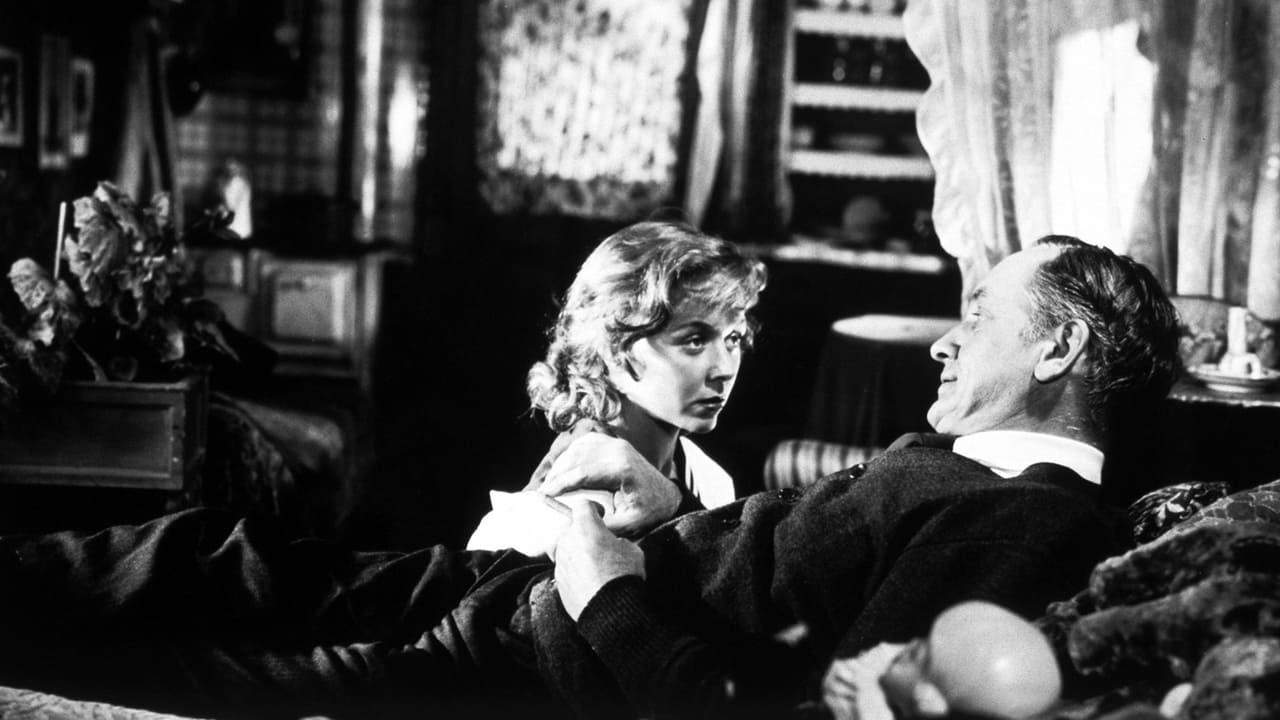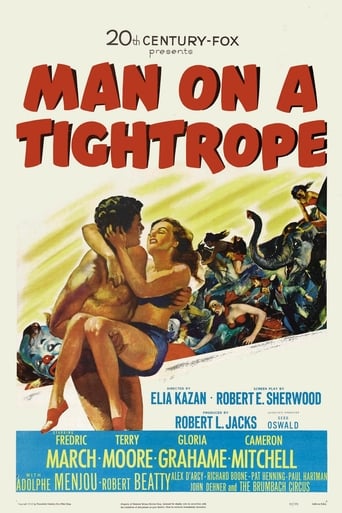EarDelightBase
Waste of Money.
Artivels
Undescribable Perfection
Noutions
Good movie, but best of all time? Hardly . . .
Bea Swanson
This film is so real. It treats its characters with so much care and sensitivity.
tomsview
I must admit I had never heard of "Man on a Tightrope" until I read Elia Kazan's autobiography, "Elia Kazan: A Life".The story is based on a true event; the escape of the entire Circus Brumbach in 1950 from East Germany to West Germany. Renamed Cirkus Cernik in the film; they escape from Czechoslovakia.Kazan tells how he agreed to make it only after he found that the story was true. He travelled to Bavaria and met the people of the circus and developed a great rapport with them.Kazan had just named names at the HUAC hearings, and was receiving hate mail and hostility from former friends and associates. Although he had once been in the communist party, he claimed he had long ago become anti-communist, and he felt right at home with these circus people who had fled a repressive communist regime; they didn't feel he had done anything wrong at all. It was a healing process for Kazan.Kazan respected the cast and crew in this film: the real circus people who played small parts or worked as extras, but also his American performers. Most weren't major stars, but he admired the honesty with which they approached their roles. They had to rough it; Germany 8-years after the war didn't provide the comforts of Hollywood. Fredric March whose career was winding down, warned him that he sometimes overacted, but he gave an affecting performance as circus owner Karel Cernik. Gloria Grahame as his cheating wife was never photographed to better advantage; she seemed naturally beautiful without her usual heavy makeup. Terry Moore as Cernik's daughter insisted on doing her own stunts including the scene in the fast flowing river.Despite being based on fact, some rather predictable dramatic elements were added and the film was hacked by the studio; ultimately it failed at the box office. However the film has a brilliantly authentic look and when you know a little of how it was made and the circumstances surrounding it, it gains a dimension far beyond what we see on the screen.
edwagreen
Chilling drama reflecting the cold war era when a Czechoslovak circus troupe plots a daring escape to freedom.Both Terry Moore and Gloria Grahame give wonderful performances as the daughter and second wife of circus owner Frederic March, who plots the escape.March is given another great role in this film. Grahame, as the vulnerable wife with little to do in her life, is in her second circus film picture of her career within a year. OF COURSE, i'm referring to 1952's THE GREATEST SHOW ON EARTH. Her emotions shown here are far better than in her Oscar win for BAD AND THE BEAUTIFUL. Ditto for Terry Moore in comparison to COME BACK,LITTLE SHEBA.As the suspicious police inspector eventually done in for failing to follow the rules, Adolphe Menjou shows his mettle.
phasermuse
I am commenting on the comments I have just read and I salute all of them. This modest movie stirred my heart and soul. It has been a very long time since I saw it for perhaps the third time and I have looked in vain for a VHS never mind DVD (although that would be great).Of course, this is purely sentimental (I suppose) but the most rending moments are when this little rag-tag circus is approaching the guard house on the border, announcing themselves, "This is the Circus Cernik This is the Circus Cernik" while the few musicians play the "Moldau." The film is well done with a perfect cast and a satisfying conclusion.Judging by the small number of comments, I can only guess that not too many people have seen this wonderful film. I think I will write to TurnerClassicMovies and see if they won't find a way to get this movie on their TV view-list.
brower8
Sleeper classics are rare. Esthetics do not change, but politics do. This movie has a political message -- that communism is horrible, and that life under communism is bare existence. That was not enough for the McCarthy Era, and this movie falls short of the standard anti-communist diatribe of its kind. The view of someone like Vaclav Havel that communism was mere degradation of people and the imposition of an absurd order was not "hard-line" enough for the McCarthy Era.This movie shows a more subtle critique of communism than the usual apocalyptic view of saber-rattling generals and madman tyrants. Czechoslovakia could have been the shopfront for communism because it wasn't as ravaged by World War II as were some other countries, and the Soviets didn't treat it as a conquered province grafted onto its empire. The country was prosperous before World War II and had a democratic government for twenty years after World War I. Even in Czechoslovakia, the communists imposed one degradation after another upon the people while promoting itself with demagogic rhetoric that communism was the desire of the working man -- except that nobody had the right to say "no" anymore. The communists nationalized Cernik's circus, only to pay him a very generous salary as compensation as a manager of a state enterprise; then they made the money worthless through currency "reforms" that pauperized all but the communists and enriched the communists. Sudden horror and slow degradation lead to the same misery, only at different rates. Politics aside, this is a good adventure film with some comic elements as the circus crew fights among itself to seek escape from the madhouse (note that Milos Forman said that his image of an asylum for the insane was much like his native Czechoslovakia in comments on "One Flew Over the Cuckoo's Nest"Too subtle for the 1950's, it got lost. In the cable-TV era "movie archive" channels try out some lost movies and occasionally find a gem. This one is a gem.

